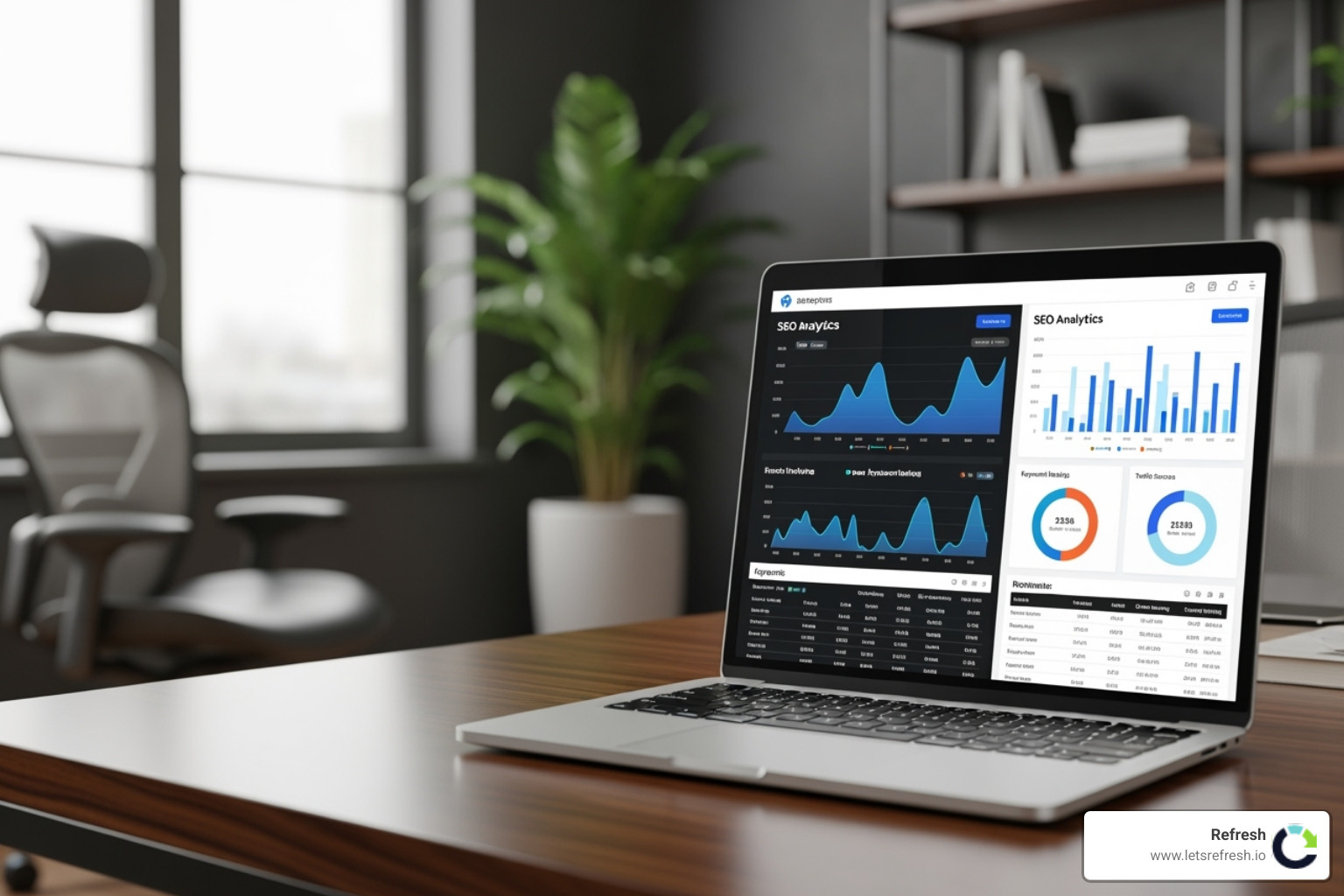October 28, 2025
The New Frontier of SEO
AI search engine optimization tools are changing how businesses approach digital marketing in 2025. These intelligent platforms combine machine learning, natural language processing, and predictive analytics to automate content creation, keyword research, and technical optimization tasks that once required hours of manual work.
Top AI SEO Tools by Category:
- Content Creation: Platforms that generate SEO-optimized articles, meta descriptions, and content briefs
- Keyword Research: Tools using AI to identify long-tail keywords and analyze search intent
- Technical SEO: Automated site audits, schema generation, and indexing assistance
- Rank Tracking: AI-powered monitoring of search positions and competitor analysis
- GEO Tools: Specialized platforms for tracking visibility in AI Overviews and generative search results
The shift toward AI-powered SEO isn't just a trend—it's necessary. According to recent industry data, 49.1% of SEO professionals believe AI will have a positive impact on website search traffic over the next five years. Meanwhile, Google's AI Overviews are now rolling out in over 100 countries, fundamentally changing how search results appear.
Traditional SEO tools that rely on basic keyword data and manual analysis are quickly becoming obsolete. Modern AI platforms can analyze hundreds of top-ranking pages in seconds, identify content gaps your competitors missed, and even predict which topics will drive the most traffic before you write a single word.
But here's what most businesses get wrong: they think AI tools will magically solve all their SEO problems without human oversight. The reality is more nuanced. The best results come from combining AI efficiency with human strategy and creativity.
I'm Alexander Palmiere, founder of Refresh Digital Strategy, where we've helped over 200 businesses leverage ai search engine optimization tools to boost their organic traffic and online visibility. Through extensive testing and client work, I've finded which AI SEO tools actually deliver results versus those that just create more work.
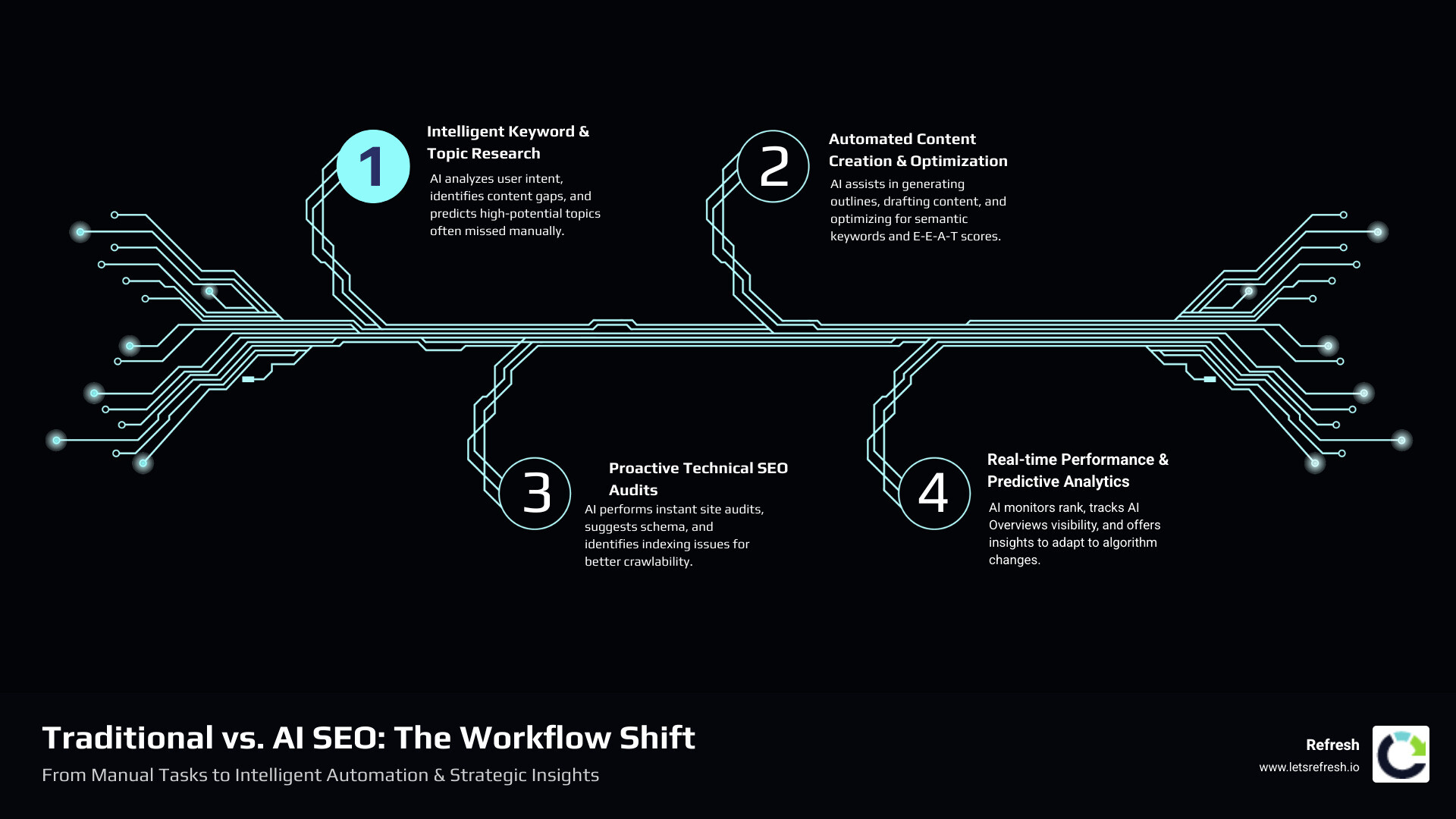
Ai search engine optimization tools terminology:
- best local SEO
- local SEO services
How AI is Fundamentally Changing Search Engine Optimization
The SEO world has shifted dramatically, and artificial intelligence is leading the charge. This isn't just about having fancier tools—it's about completely rethinking how search engines understand and rank content.
Think about it this way: traditional SEO was like playing chess with yesterday's rulebook. AI has rewritten the entire game. Machine learning algorithms now analyze millions of web pages in seconds, while natural language processing helps search engines understand context and user intent like never before.
The benefits are game-changing. Automation handles the tedious stuff—keyword research that used to take hours now happens in minutes. Predictive analysis lets us anticipate algorithm changes before they hit. And data-driven insights reveal patterns that human analysis would miss entirely.
For businesses, this means efficiency on steroids. Instead of spending days analyzing competitor content, AI tools deliver comprehensive reports instantly. They spot content gaps, suggest optimization strategies, and even help you stay ahead of algorithm updates. It's all part of building a solid digital strategy SEO approach that actually works.
The real magic happens when ai search engine optimization tools combine all these capabilities. They don't just tell you what happened—they predict what's coming next.
The Shift from Traditional Tools to AI-Powered Platforms
Remember the old days of SEO? You'd manually check keyword rankings, spend hours analyzing competitor websites, and basically play a guessing game with Google's algorithm. Traditional SEO tools were reactive—always one step behind.
AI flipped this script completely. Instead of reactive analysis, we now have predictive insights. While old-school tools might show you keyword search volume, modern AI platforms create entire content strategies around those keywords. They analyze top-ranking pages, suggest content structures, and even draft initial content—all based on what's actually working right now.
The deeper data analysis is where things get really interesting. AI tools don't just look at surface metrics. They understand semantic analysis—how words relate to each other and what users really mean when they search. They spot internal linking opportunities you'd never notice manually and provide competitor intelligence that goes way beyond basic keyword overlap.
This change is especially powerful for smaller businesses. You get enterprise-level insights without needing a team of SEO experts. The best SEO tools for small businesses now include AI features that were unimaginable just a few years ago.
Understanding Generative Engine Optimization (GEO) and AI Overviews
Here's where things get really exciting—and a bit scary for traditional SEO. Generative AI has created an entirely new playing field called Generative Engine Optimization or GEO.
Google AI Overviews are the perfect example. These AI-generated summaries appear at the top of search results, answering user questions directly. Users might never click through to your website because they got their answer right there in the search results.
This changes everything about optimizing for conversational answers. You're not just competing for clicks anymore—you're competing to be the source that AI trusts and cites. Your content needs to be clear, comprehensive, and structured in ways that conversational AI can easily understand and reference.
Tracking brand visibility in these AI-powered results is crucial but tricky. How often does Google's AI cite your content? Are you appearing in AI Overviews for your target keywords? The Semrush study on AI Mode revealed some fascinating patterns—certain platforms like Reddit dominate AI results, appearing in over 40% of responses.
This connects directly to the role of AI and chatbots in modern website development. It's not just about creating content anymore—it's about creating content that AI systems can easily parse, understand, and recommend to users.
The bottom line? Ai search engine optimization tools now need to track both traditional rankings and AI visibility. Welcome to the future of search.
The Best AI Search Engine Optimization Tools in 2025
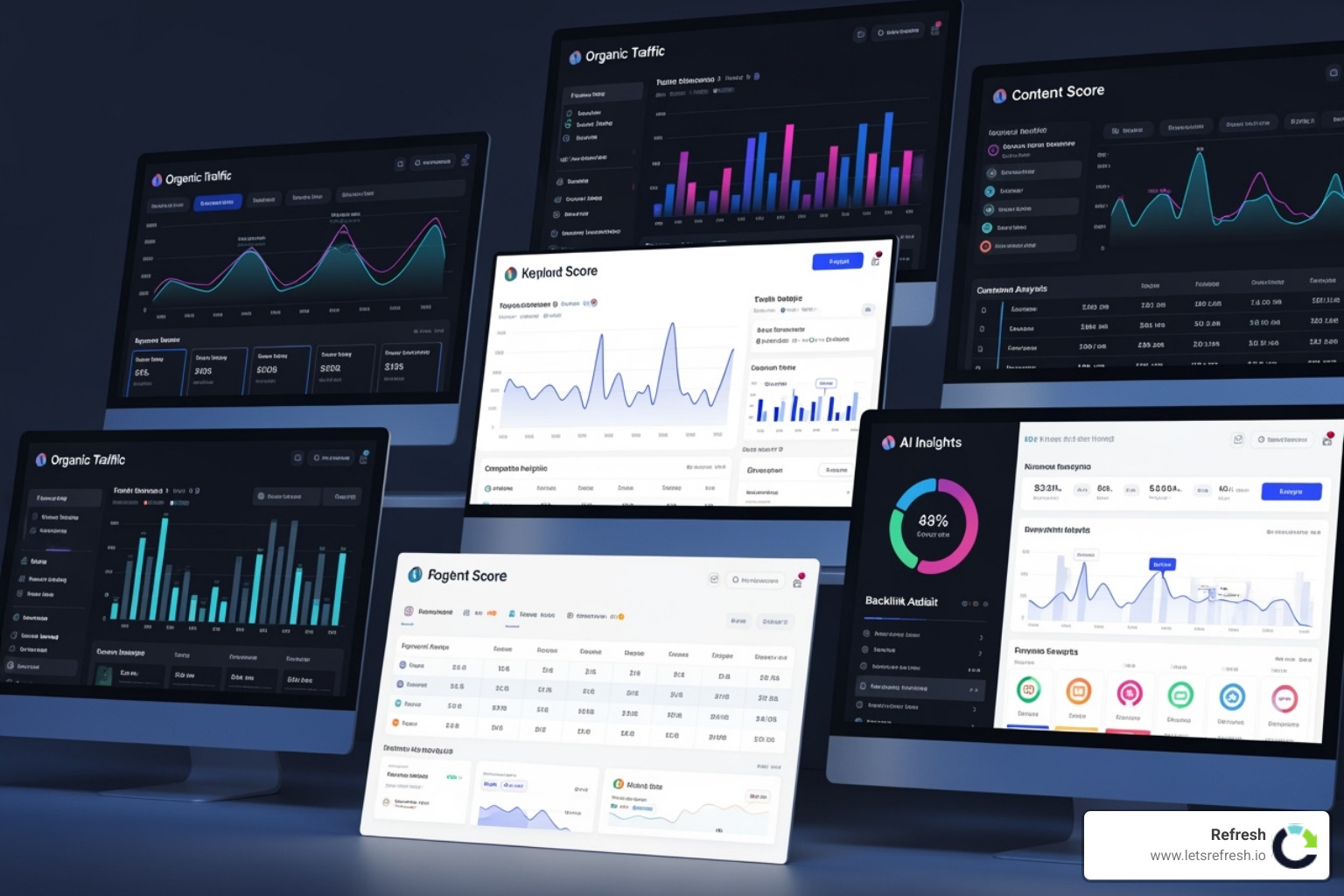
When we talk about the "best" ai search engine optimization tools available in 2025, we're looking at platforms that offer a blend of cutting-edge AI capabilities with practical, actionable insights. These tools typically fall into several categories, each addressing different facets of SEO: content creation, keyword research, technical SEO, rank tracking, and specialized GEO monitoring.
All-in-One Content Creation and Optimization Platforms
These platforms are the workhorses for content marketers and SEOs, automating much of the content lifecycle. They assist with everything from initial research to final optimization.
How can AI SEO tools automate content creation and optimization? These tools excel at generating outlines, writing first drafts, creating meta descriptions, and optimizing content for semantic keywords. They analyze top-ranking pages to provide SEO content briefs, complete with recommended headings, keyword suggestions, and target word counts. Some advanced platforms even offer real-time on-page optimization scores as you write, guiding you to create content that aligns with search engine preferences and user intent. This significantly streamlines our SEO digital marketing content strategy. For example, we've seen tools that can generate a full-length, optimized content brief in as little as 6 seconds, and some claim to allow users to generate 5x more content with the same effort.
One of the most valuable features we've found is the "humanizer" function offered by some of these tools. While AI can draft content quickly, it sometimes lacks a natural, human touch. Humanizer features help transform robotic-sounding text into authentic, engaging content, which is crucial for maintaining brand voice and connecting with readers. These tools also integrate with platforms like WordPress, allowing for seamless publishing.
Specialized Tools for Keyword Research and Strategy
While all-in-one platforms include keyword features, specialized ai search engine optimization tools dive deeper into the nuances of keyword strategy.
How do AI SEO tools help with keyword research and analysis? They go beyond simple search volume and competition metrics. These tools use AI to identify long-tail keywords that might be overlooked, understand the underlying user intent behind queries, and even find conversations on platforms like Reddit and Quora related to your topic. This helps us uncover hidden opportunities and address specific user needs.
Many of these tools also excel at keyword clustering, grouping related keywords into comprehensive topics. This is vital for building topical authority, a key ranking factor. Instead of optimizing for individual keywords, we focus on covering entire topics comprehensively, signaling expertise to search engines. Some platforms even build topical maps automatically, analyzing competitors to identify content gaps and areas where you can dominate a niche. This aligns perfectly with our focus on the role of keywords in SEO and how to use them effectively.
The top ai search engine optimization tools for GEO and Rank Tracking
The emergence of AI Overviews and conversational AI means rank tracking isn't just about traditional SERP positions anymore.
How do AI SEO tools help track brand visibility in AI search results? Dedicated GEO tools and AI-powered rank trackers monitor your brand's presence in AI-generated answers from platforms like Google's AI Overviews, ChatGPT, and other LLMs. They can tell you if your content is being cited, what position it holds in these AI responses, and how your visibility compares to competitors. We've seen tools that allow granular tracking by search term, AI engine, and region, providing a comprehensive view of your digital footprint in the new AI search landscape.
One comprehensive SEO software, for instance, offers an "AI Overviews Tracker" that helps you monitor exactly where and how your site appears in Google's AI-generated answers. It allows you to compare rankings in traditional SERPs versus AI-generated results, see which competitors appear in AI Overviews, and even view historical snapshots of AI snippet changes. This level of insight is invaluable for adapting our strategies to the evolving search landscape. SE Ranking is an example of a comprehensive tool that includes such features.
Essential ai search engine optimization tools for Technical and On-Page SEO
Technical SEO often feels like a dark art, but AI is bringing much-needed clarity and automation to this crucial area.
Can AI SEO tools assist with on-page optimization and content strategy? Absolutely. Beyond content creation, many ai search engine optimization tools offer robust features for technical and on-page SEO. They can perform automated site audits, identifying issues like broken links, crawl errors, and missing schema markup. Some tools can even generate schema markup with a single click, helping search engines better understand your content and potentially leading to richer search results.
Internal linking is another area where AI shines. These tools can analyze your website's structure and suggest optimal internal links, improving both user experience and search engine crawlability. We've also seen tools that automate the indexing process, ensuring that newly published pages get finded by search engines faster, without weeks of waiting for Google to catch up. This is a game-changer for speeding up content visibility. This proactive approach to on-page SEO search engine optimization is essential for modern websites.
How to Strategically Use AI to Improve Your Search Rankings
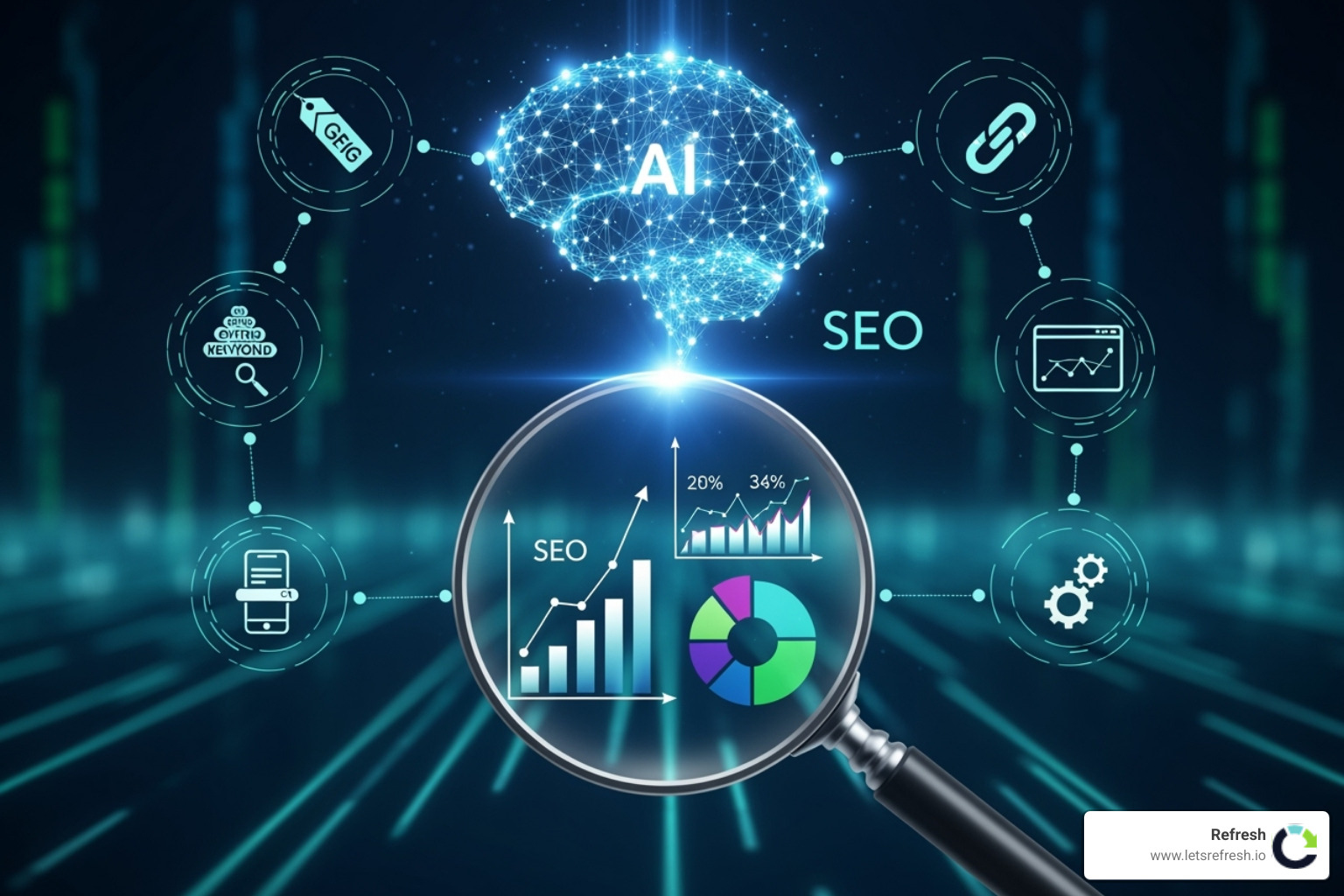
The real magic happens when you stop thinking of ai search engine optimization tools as replacements for human expertise and start seeing them as powerful amplifiers of your strategy. At Refresh, we've learned that the most successful SEO campaigns combine AI efficiency with thoughtful human oversight.
Think of AI as your incredibly fast research assistant who never gets tired. It can analyze hundreds of competitor pages while you grab your morning coffee, but it still needs you to make the strategic decisions about what that data means for your business.
The key is building workflows that leverage AI's strengths while keeping humans in control of the creative and strategic elements. This approach has consistently delivered better results for our clients than either purely manual work or over-relying on automation.
Automating Content Creation and Optimization
Content creation used to feel like climbing a mountain every single time. Now, with the right ai search engine optimization tools, it's more like having a skilled writing partner who helps you get started and keeps you on track.
Generating outlines and first drafts becomes effortless when AI analyzes what's already ranking well for your target topics. Instead of staring at a blank document wondering where to begin, you get a structured roadmap based on real search data. The AI can even write initial sections, giving you something concrete to refine and improve.
Creating meta descriptions that actually get clicks is another area where AI shines. These tools understand what makes people want to click through from search results, crafting descriptions that balance SEO optimization with genuine appeal to human readers.
Optimizing for semantic keywords is where AI really shows its intelligence. Rather than obsessing over exact keyword matches, these tools help you naturally incorporate related terms and concepts that search engines associate with your main topic. This creates content that feels comprehensive and authoritative.
Repurposing content becomes almost magical with AI assistance. That detailed blog post can become social media content, email newsletters, and even video scripts with minimal effort. This connects beautifully with modern programmatic SEO & AI strategies that maximize every piece of content you create.
Here's what we've learned the hard way: AI-generated content still needs your human touch. The tools are brilliant at structure and optimization, but they can't replicate your brand voice or ensure every fact is accurate. We always review and refine everything before it goes live.
Enhancing Keyword Research and Analysis
Remember when keyword research meant manually scrolling through endless lists of search terms? AI has transformed this tedious process into strategic goldmining that actually gets exciting.
Identifying long-tail keywords becomes almost effortless when AI can process thousands of search queries and find those specific, high-intent phrases your competitors missed. These longer, more specific keywords often convert better because they capture people who know exactly what they want.
Understanding user intent goes far beyond just looking at search volume numbers. AI analyzes the context around searches to determine whether someone wants information, plans to buy something, or needs to solve a specific problem. This insight helps you create content that truly satisfies what searchers are looking for.
Finding content gaps happens at lightning speed when AI compares your content against dozens of competitors simultaneously. It spots topics and angles that haven't been adequately covered, giving you clear opportunities to create something unique and valuable.
Clustering keywords into topics helps you build real authority instead of chasing individual keywords. AI groups related terms together, showing you how to create comprehensive content that establishes expertise across entire subject areas. We often combine this approach with insights from "exploring Google Trends: a beginner's guide to leveraging SEO data" for an even clearer picture of search behavior.
Adapting to Google's Algorithm Updates
Google's algorithm changes used to feel like surprise pop quizzes you couldn't study for. AI tools have changed this dynamic completely, giving us early warning systems and rapid response capabilities.
Monitoring SERP volatility means getting alerts when search results start shifting dramatically. This early detection system helps us investigate potential algorithm updates before our clients' rankings take a hit. It's like having a weather radar for SEO storms.
Analyzing top-ranking content changes happens in real-time now instead of weeks later. When Google updates its preferences, AI tools can immediately analyze what characteristics the newly ranking pages share. Maybe Google started favoring longer content, more images, or different types of expertise signals.
Aligning with Helpful Content updates requires understanding Google's increasing focus on genuine value for users. AI tools help evaluate content for readability, comprehensiveness, and user satisfaction signals. Google has been clear in their guidance on AI-generated content that using AI to create genuinely helpful content is perfectly acceptable, while using it to manipulate rankings violates their policies.
E-E-A-T signals (Experience, Expertise, Authoritativeness, and Trustworthiness) can be strengthened with AI assistance. These tools suggest where to add author credentials, external citations, or specific data points that reinforce your content's credibility. The goal is demonstrating real expertise, not just checking boxes.
The most important lesson we've learned is that successful SEO strategy for small business requires staying adaptable. AI tools give us the speed and insight to pivot quickly when search engines change their rules, but human judgment determines how we apply those insights strategically.
Frequently Asked Questions about AI SEO Tools
We get these questions all the time from clients who are curious (and sometimes worried) about diving into ai search engine optimization tools. Let me share what we've learned through real experience.
Is AI-generated content bad for SEO?
Here's the truth that might surprise you: AI-generated content isn't inherently bad for SEO. Google has made this pretty clear in their official guidance—they don't care if a robot or a human wrote your content, as long as it's helpful and valuable to users.
The real issue isn't the AI part—it's the quality part. Google's Helpful Content System is laser-focused on weeding out content that exists solely to manipulate search rankings. Whether that manipulation comes from a human content farm or an AI content farm doesn't matter to their algorithms.
What does matter is how you use AI. We've seen businesses succeed wildly with AI-assisted content, and others get penalized for AI-generated fluff. The difference? Human oversight and genuine value creation.
When we use ai search engine optimization tools for content creation, we treat AI as our research assistant and first-draft writer, not our final editor. Every piece gets human review for accuracy, brand voice alignment, and most importantly—does this actually help our reader solve their problem?
The E-E-A-T principles (Experience, Expertise, Authoritativeness, Trustworthiness) still apply whether AI touched your content or not. Your content needs to demonstrate real knowledge and provide genuine value. AI can help you get there faster, but it can't replace the human insight that makes content truly helpful.
Can AI completely replace SEO professionals?
Short answer: Not a chance. And honestly, that's great news for everyone involved.
Ai search engine optimization tools are incredibly powerful at handling the repetitive, data-heavy tasks that used to eat up our days. They can analyze thousands of keywords in seconds, generate content outlines, and spot technical issues faster than any human ever could. But here's what they can't do: think strategically about your unique business challenges.
AI handles the "what" and "how"—humans handle the "why." When a client's traffic suddenly drops, AI can tell us which pages were affected and what changed in the search results. But it takes human experience to understand why their specific audience stopped engaging and what that means for their business goals.
The creativity factor is huge too. AI can write, but can it understand why your brand voice resonates with middle-aged entrepreneurs versus college students? Can it craft a content strategy that builds genuine trust with your audience? Can it sit in a client meeting and translate their business frustrations into an actionable SEO roadmap?
What's really happening is that SEO professionals are evolving. Instead of spending hours on keyword research spreadsheets, we're focusing on strategy, relationship building, and solving complex problems that require human intuition. AI makes us better at our jobs—it doesn't replace our jobs.
How do I choose the right AI SEO tool for my business?
This is where a lot of businesses get overwhelmed. There are dozens of ai search engine optimization tools out there, each promising to be the game-changer you need. But here's the thing—the best tool is the one that actually fits how you work.
Start with your biggest pain point. Are you drowning in content creation? Look for tools that excel at generating drafts and optimizing existing content. Struggling with keyword research? Focus on platforms that offer semantic analysis and search intent insights. Can't keep up with technical SEO audits? Prioritize tools with strong site analysis features.
Budget matters, but don't just look at the price tag. We've seen small businesses get incredible results from mid-tier tools because they actually used them consistently. Meanwhile, others bought premium platforms that sat unused because they were too complex for their team. The tool you'll actually use is worth more than the tool with the most features.
Think about your team's comfort level with technology. Some ai search engine optimization tools require a steep learning curve, while others are designed for beginners. If your team won't adopt it, it won't help your business. Most platforms offer free trials—use them to test not just the features, but how intuitive the interface feels.
Integration is often overlooked but incredibly important. Does the tool play nicely with your existing systems? Can it connect to your WordPress site, Google Analytics, or other platforms you rely on? Seamless workflow integration saves time and reduces frustration.
For many small businesses, working with an affordable SEO company for small businesses can be a smart way to access these powerful tools without the learning curve or monthly subscriptions. Sometimes the best choice is partnering with experts who already know which tools work best for businesses like yours.
Conclusion: Balancing Automation with Human Expertise
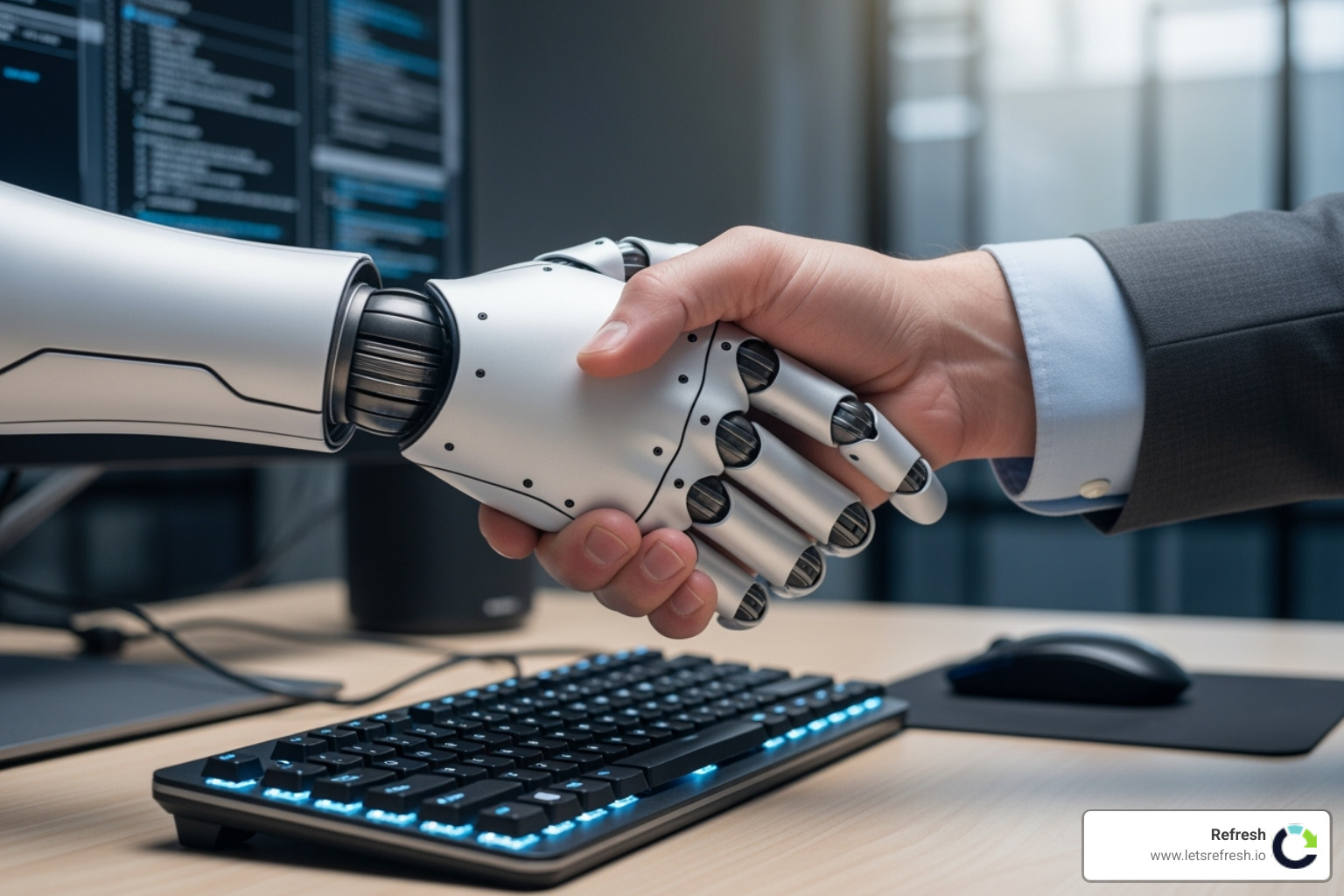
We've covered a lot of ground together, haven't we? The world of ai search engine optimization tools is vast and rapidly evolving, but the core message remains beautifully simple: AI is here to make our lives easier, not replace the human spark that drives great marketing.
Think about where we started. Traditional SEO used to feel like detective work—piecing together clues from keyword data, manually analyzing competitors, and hoping our content would hit the mark. Now, AI handles the heavy lifting while we focus on what humans do best: strategic thinking, creative problem-solving, and building genuine connections with our audience.
The rise of Generative Engine Optimization and Google's AI Overviews isn't just another trend to chase. It represents a fundamental shift in how people find and consume information. When someone asks an AI assistant for restaurant recommendations or troubleshooting advice, your business needs to be part of that conversation. Ai search engine optimization tools help ensure you're visible in this new landscape.
But here's what I've learned after working with hundreds of businesses: the most successful companies aren't the ones with the fanciest AI tools. They're the ones who understand that technology amplifies strategy, not replaces it. AI can generate content in seconds, but it takes human insight to know what story your audience needs to hear. AI can identify trending keywords, but it takes human empathy to understand the pain points behind those searches.
At Refresh, we see ourselves as translators between the technical possibilities of AI and the real-world needs of your business. We use cutting-edge ai search engine optimization tools to automate the time-consuming tasks, but every strategy we develop is rooted in understanding your unique brand voice, your customers' journey, and your long-term business goals.
The future of SEO isn't about choosing between human expertise and artificial intelligence—it's about creating a partnership where both thrive. AI handles the data analysis, content optimization, and technical audits. Humans provide the vision, creativity, and strategic direction that turns that efficiency into meaningful results.
Ready to see how this human-AI partnership can transform your online presence? We'd love to show you what's possible when cutting-edge technology meets thoughtful strategy. Explore our SEO services and let's build something remarkable together.
Still have questions? Let’s talk about it.
.avif)




